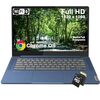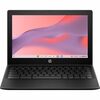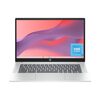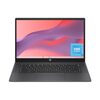Microsoft's Desperate Attempt to Discredit Chromebooks
Microsoft is well known for spreading FUD to harm their competition. A business strategy that may work to some extent, but is also a sign that Microsoft lacks confidence in their own products.
Microsoft recently published a Microsoft Educast on YouTube where they compared Chromebooks to Windows 8 laptops. The video has been set to private in the meantime, I suppose the feedback wasn't very positive.
Unsurprisingly, Microsoft can't see many good things in Chromebooks, admitting they are super low-cost, but of course there are reasons for that. In the 9 minute video they manage to get several things wrong though. Maybe not as embarrassing as other MS FUD campaigns, but still worth a closer look.
The Samsung Chromebook 2 is the most popular Chromebook
What is meant by popularity, sales figures? Of course, there is no source backing this statement, neither in the video nor its description. I don't know any publication that provides these numbers accurately, but I know that I read many statements on Reddit, Twitter and Google+ that indicate the Acer C720 Chromebook being a very popular and satisfying choice.
Interestingly, the Acer C720 was the top selling laptop of all laptop computers on Amazon when checked on Sep 1, 2014 and the Samsung Chromebook 2 was listed at no. 32.
The popularity claim feels like a random statement Microsoft throws at their audience just because they can. The top spot on Amazon being hold by a Chromebook though, feels like it is what motivates MS to produce educational videos like this one.

30% of all American households don't have access to Internet
According to a PDF report from the US Census Bureau 74.8% of all households had Internet use at home in 2012, they probably used Microsoft's built-in calculator to get to 30% without access. Also this was 2012 and it is very likely that the number of households with Internet access has increased since then.
The Windows guy in the video identifies those people with no Internet access as the ones that are going to need these low-cost devices. If this were the case, why does MS bother at all with Chromebooks?
You have to type a 53 character command to access storage information
This is Microsoft's argument to prove the statement Chromebooks are easy to use wrong. While you can access storage information by typing a URL in Chrome you can also access it via the Chrome OS files app. Also Microsoft's computer experts don't seem to have heard of this totally new concept called bookmarks. Those poor guys have to type URLs all the time or – even worse – use Bing.
The typical you have to type commands on Linux argument is just plain nonsense and has been for quite some time now. People prefer different kinds of user interfaces, some even like to type commands, but you don't have to in many Linux based systems including the Chrome operating system.
Easy to use is a quality largely affected by an individual's previous experience. Using Chrome OS shouldn't be that hard for people who use the Chrome browser, and there are a lot of them.

Valid Criticisms
There are certainly limitations to Chromebooks and Chrome OS as well as valid criticisms, some of them even correctly pointed out in this video and others missed.
Hidden costs
I don't know how much the bandwidth costs pointed out in the video are a real issue, but Chromebooks are intended to be used in the cloud. They are an opportunity for Google to bind existing customers and acquire new ones for their own services like Google Drive.
There will be costs, if users exceed fixed limits, that are usually so low that many users eventually will. Of course, Microsoft offers similar cloud services and wants Windows users to use them.
Limited power and storage
Any computer has its limits and Chromebooks are usually at the lower end. If you want to get work done on a Chromebook and that implies performing very demanding tasks in terms of computing power, you're better off with a higher specced laptop.
Chromebook hardware will keep on improving and there will probably be more powerful models in a higher price range, that are suitable for more demanding use cases, but for now power users should look for something else.
Native vs. Web apps
Not being able to install the applications you're used to work with is the biggest limitation I see with regards to Chrome OS. There are so many applications I've been using for years, knowing the keyboard shortcuts and where to find what, that I wouldn't want to replace them with something else. Also I have a hard time seeing Web applications becoming as responsive and snappy as native applications in the near future, so Chrome OS is just not enough for me.
So are Chromebooks any good?
It depends on your needs. If you want a secondary laptop for consuming rather than producing stuff, Chromebooks may just be perfect for you. Of course, it makes the most sense if you use Google services, but if you live online and are using other service providers, Chromebooks should still be fine.
If you're okay with installing a different operating system using Crouton or alternative approaches, you may well be using Chromebooks to get work done. To be fair, you probably can get some serious work done in Chrome OS too.
Chromebooks running Chrome OS are low-cost computers and the whole model of the auto-updating and secure operating system, that can be synced across devices, is very convenient, particularly for heavy mobile use. Whether they are right for you, is something you have to answer, no one else, especially not a company as untrustworthy as Microsoft.
• Linux vs Windows Microsoft Opinion FUD
To be informed of new posts, subscribe to the RSS feed or follow Linux Netbook on Facebook.
Affiliate Disclosure: External links on this website may contain affiliate IDs, which means that I earn a commission if visitors make a purchase via such a link. For details, see the disclosure page.
Related products
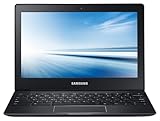
Samsung Chromebook 2 (11.6-Inch, Jet Black)
Search Amazon